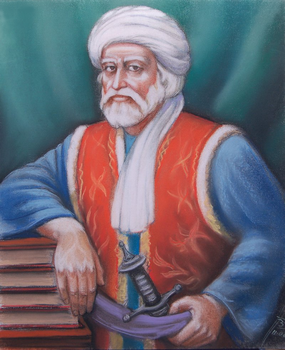
Abdul Ghaffār Khān BR, also known as Bacha Khan or Badshah Khan was a Pashtun independence activist, and founder of the Khudai Khidmatgar resistance movement against British colonial rule in India.

Khošāl Khān Khaṭak (Pashto: خوشال خان خټک; Urdu, Persian: خوشحال خان خٹک; 1613 – 25 February 1689), also known as Khushal Baba, was a 17th-century Pashtun poet, chief, and warrior. Khushal Khan served the Mughal Empire protecting them from Pashtun warriors over most of his lifespan. After being expelled from his tribal chiefdom and replaced with his son by his Mughal superiors, Khushal Khan turned against the Mughals. Afterwards, Khushal preached the union of all Pashtuns, and encouraged revolt against the Mughal Empire, promoting Pashtun nationalism in the last years of his life through poetry. Khushal wrote many works in Pashto but also a few in Persian. Khushal is considered the "father of Pashto literature" and the national poet of Afghanistan.

Khan Abdul Ghani Khan was an Afghan Pashto language philosopher, poet, artist, writer and politician. He was a son of Abdul Ghaffar Khan, a prominent British Raj-era independence activist. Throughout his life as a poet in both British India and Afghanistan, Khan was known by the titles Lewanay Pālsapay and Da īlam Samander.
The Babrra Massacre was a mass shooting on 12 August 1948 in the North-West Frontier Province (NWFP) of Pakistan. According to official figures, around 15 protestors were killed while around 40 were injured. However, Khudai Khidmatgar sources maintained that around 150 were killed and 400 were injured.

The Pashto media includes Pashto literature, Pashto-language newspapers, magazines, television and radio stations, as well as Pashto films and Pashto internet. Pashto media involves the Pashtuns of Pakistan, Afghanistan and the Pashtun diaspora around the world.

Pashto literature refers to literature and poetry in Pashto language. The history of Pashto literature spreads over five thousands years having its roots in the oral tradition of Tappa. However, the first recorded period begins in 7th century with Amir Kror Suri. Later, Pir Roshan (1526–1574), who founded his own Sufi school of thoughts and began to preach his beliefs. He gave Pashto prose and poetry a new and powerful tone with a rich literary legacy. Khair-ul-Bayan, oft-quoted and bitterly criticized thesis, is most probably the first book on Sufism in Pashto literature. Among his disciples are some of the most distinguished poets, writers, scholars and sufis, like Arzani, Mukhlis, Mirza Khan Ansari, Daulat and Wasil, whose poetic works are well preserved. Akhund Darweza (1533–1615), a popular religious leader and scholar gave a powerful counterblast to Bayazid’s movement in the shape of Makhzanul Islam. He and his disciples have enriched the Pashto language and literature by writing several books of prose.

Kabir Stori was a Pashtun nationalist, poet, and writer from Kunar Province of Afghanistan. He was chairman of the Pashtoons Social Democratic Party, a political party that he founded, until his death.
Mohammad Gul Khan Momand, was both a literary figure and a politician in Afghanistan. He also served as an Army Officer during Afghanistan's Independence war in 1919. He served numerous Government and Leadership positions including Home Minister of Afghanistan.
The Bahram Khan family is a major political family from Charsadda, Khyber Pakhtunkhwa province of Pakistan.
Rahmat Shah Sail is a prominent Pashtoon poet in the Pashto language, belongs to the Utmankhel tribe.

Qazi Ataullah Khan the Minister of Education announcing the first Education Policy of NWFP province
Pashtun Americans are Americans who are of Pashtun origin, an Eastern Iranian ethnic group originating from Afghanistan and Pakistan.
The Bannu Resolution, or the Pashtunistan Resolution, was a formal political statement adopted by Pashtun tribesmen who had wanted an independent Pashtun state on 21 June 1947 in Bannu in the North-West Frontier Province (NEFP) of British India. The resolution demanded the British to offer the option of independence for Pashtunistan, comprising all Pashtun territories in British India, rather than choosing between the independent dominions of India and Pakistan.

Manzoor Ahmad Pashteen is a Pakistani Pashtun human rights activist from South Waziristan. He is chairman of the Pashtun Tahafuz Movement, a social movement based in Khyber Pakhtunkhwa and Balochistan. From 11 to 14 March 2022, he was part of the Pashtun National Jirga, which was held in Bannu to discuss the critical issues faced by the Pashtuns in Pakistan and Afghanistan.
Sahib Shah Sabir was a renowned poet of the Pashto language in the modern era. He held a PhD degree in literature along with three master's degrees in Pashto literature, Urdu literature, and political science, all from the University of Peshawar.
The All India Pakhtoon Jirga-e-Hind, commonly known as the Jirga-e-Hind, is an organisation representing the interests of Pashtuns in India. It is chaired by Yasmin Nigar Khan.
Sher Ali Bacha, commonly known as Bachajee (باچاجي), was a Pakistani communist politician, Pashto language poet and human rights activist. He was one of the founding members of the Mazdoor Kisan Party (MKP) and the Pashtunkhwa Milli Awami Party (PMAP).
Shams Buneri was a Pakistani Pashtun nationalist, progressive, revolutionary poet, writer, and scholar who served as Secretary of Culture for Awami National Party (ANP).







